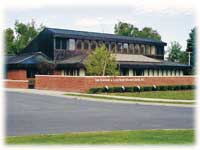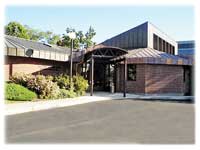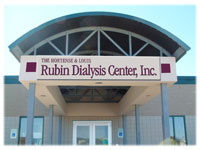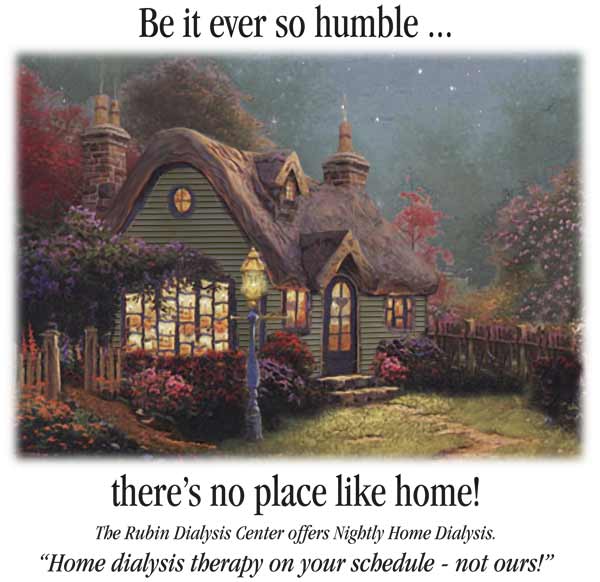
This site is dedicated to providing you with up to date
news and events, plus information about our facilities.
Please bookmark our site now for future reference.







More Frequent & Longer Hemodialysis
For the last 20 years, the Rubin Dialysis Center has been a pioneer in improving dialysis therapies. For the last 8 years we have been one of the innovators in providing daily hemodialysis, at home, at night, while people sleep. One of only 15 units in the US that offer this kind of dialysis, we have trained over 50 patients and have observed many benefits to patients. There are no dietary or fluid restrictions; fewer medications for blood pressure, anemia, and phosphorus control; more energy; free daytime hours; fewer hospitalizations; and overall improved quality of life.
Because our experience has mirrored that of others offering nocturnal home hemodialysis (NHHD), the National Institutes of Health (NIH) and Medicare (CMS) are funding a carefully designed scientific study to prove the benefits of NHHD compared to conventional in-center, three days a week hemodialysis. Since May 1, 2006, the Rubin Center has been inviting patients to participate in this study, which may benefit them as well as future kidney failure patients.
The NIH-CMS study will recruit 250 patients in 12 centers in the US and Canada over the next 26 months. The Rubin Center hopes to study 24 patients for 14 months each. These patients will have special MRI's done of heart function, and will have other special testing done before, during, and at the end of the 14 months that they are in the study. Half of the patients who agree to participate will be trained to do NHHD for the 14 months; half will remain on in-center hemodialysis.
This kind of study is called a randomized controlled study and is the best kind of medical study. All of the patients will be capable of doing NHHD, but only half will be trained. Patients who participate in the study and remain in-center will have the option of being trained for NHHD after their 14 months are over.
This is a very exciting opportunity for the Rubin Center and our patients, as it may lead to better treatment for all patients. We invite you to look at the brochure for the study and call us if you are interested or have questions (518-587-1919).
Christopher Hoy, MD, Nightly Home Hemodialysis (NHHD) Program Director
Shari Meola, RN, CNN, Clinical Services Coordinator









Overnight Home Hemodialysis
Peritoneal Dialysis and
NxStage¨ Short-daily Home Hemodialysis.
Our clinical team can help decide whether any of these are right for you.
Over the last 30 years of dialyzing millions of patients with chronic kidney disease, it is clear that "more is better". Patients who receive more dialysis feel better than patients who get less. In addition, it's clear that patients who take control of their own treatments do better than those who are passive and submit to what they are told to do.

Daily Nocturnal Hemodialysis (DNHD) is a realistic and effective way to do more dialysis, to allow patients to control their own treatments and to regain control of their own lives. Since 1998, the Rubin Dialysis Center has offered chronic kidney failure patients the opportunity to be hemodialyzed at home, at night, while they sleep. Our DNHD patients are dialyzed 6 nights a week, for 7-8 hours per night. While they sleep, they are remotely monitored over the Internet by specially trained technicians at our Saratoga Springs Center.
Our patients receive twice as much dialysis as our conventional in-center patients. As a result, they feel much better. In fact, many say they feel "normal". When was the last time a conventional dialysis patient could say that? DNHD patients have no restrictions on fluids or diet. They wake up feeling rested and energetic. They think more clearly. Their appetites improve. Many return to work or school, because they feel so much better. They need fewer medications to control blood pressure and to prevent anemia. Most require few if any medications to control phosphorus in their blood. In fact we often have to encourage our patients to eat more cheese and milk products.
Nothing is as good as having your own kidneys, but daily nocturnal hemodialysis may be the next best alternative.
The Home Therapies Team of the Hortense and Louis Rubin Dialysis Center, Inc. now offer a new, more user friendly home dialysis machine. The NxStage¨ System OneTM, a simple, modular unit of only 70 pounds, uses sterile, pre-mixed dialysate in bags that are attached to the top of the machine for each treatment. This eliminates the need for a complex water treatment system installation and large volumes of water. The "drop-in cartridge" and more automated set up are designed to make this a quicker, more "user friendly" treatment option than other equipment previously available for home hemodialysis use.

In addition to making the health benefits of daily therapy more accessible, the ability to travel with your NxStage machine and have your supplies sent to you at that location is another benefit of this "patient friendly" technology. While this machine, and the short daily dialysis it gives, is not appropriate for every dialysis patient, a good number of patients can benefit from being fully trained and "in control" of their dialysis care.
This "simple, flexible, portable dialysis" allows the patient to have treatment when it is most convenient to their schedules ... not ours.
Peritoneal Dialysis (PD) is a treatment that is done at home. It requires the use of a soft, flexible catheter to be inserted into the abdomen. Fluid, called dialysate, is allowed to flow through the catheter into the abdomen, where it dwells for a period of time. This infused dialysate absorbs excess toxins and fluid that your own kidneys can no longer do. The dialysate is drained and replaced with fresh fluid either several times during the day or by a machine at night while you sleep. There are no needles for this type of therapy and the many benefits include: maintaining your residual kidney function longer, improve your chances of getting a kidney transplant, flexible and less restrictions on diet and fluid intake, less or no insurance co-pays, and it is easier to keep a job with this flexible therapy. Training takes 1 to 2 weeks and after you complete that, the supplies are delivered to you at your home on a monthly basis. Our Rubin Center Home Therapies team is on-call 24 hours a day, 7 days a week to support our patients with their home therapies. Especially for new patients with renal failure requiring dialysis, this is a good therapy to start with and maintains your lifestyle, ability to travel, and have more free time.
Please pursue inquires to either
Shari Meola, RN, CNN, Clinical Services Coordinator or
Dr. Christopher Hoy, DNHD Program Director
at 518-587-1919
Rubin Home Therapy Options posters
webmaster@lergraphics.com

